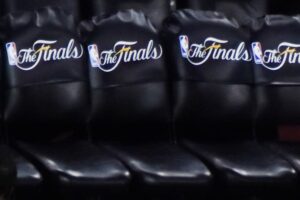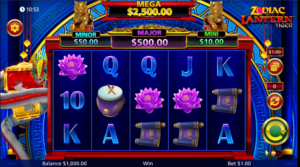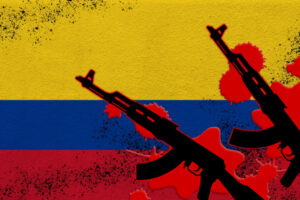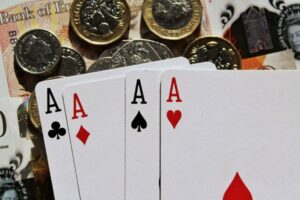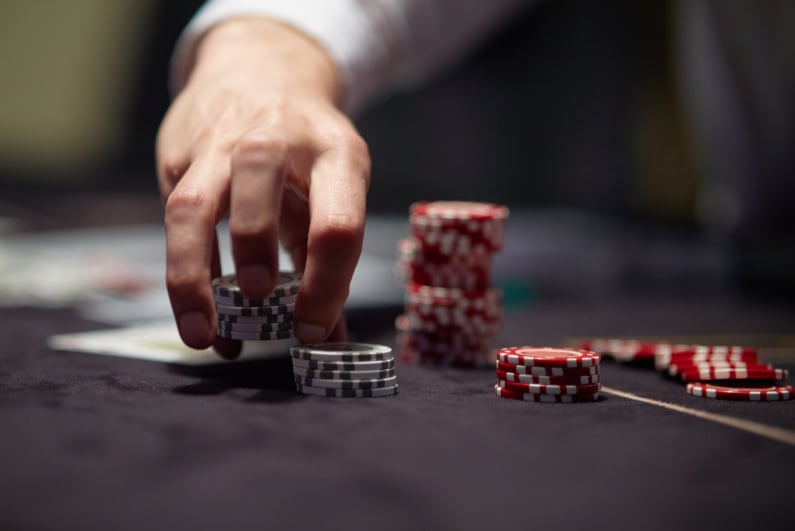
Chess to ultramarathons
It’s February 2008, and it’s less than a year since my brother taught me the basics of No Limit Hold’em. We’d both played draw poker as kids, before we got into chess. That obsession got us into our early 20s, at which point we both realized that while we had some talent for the game, and could expect to win the odd local tournament here and there, it didn’t matter how hard we studied – we’d never be grandmasters.
My brother stuck with chess for a few more years, while I made the switch to bridge, when a work colleague (an international class Malaysian called Jacob) taught me the game one afternoon. That evening we played and won our first tournament in the Civil Service club, and I was hooked.
Bridge was my new obsession until Jacob relocated to London and I needed a new partner. I taught my brother and, for the next couple of years, we played together and even won a few events. We drifted out of that game when he also moved to London and family and work priorities left me less motivated to train up a new partner.
in my late 30s I transitioned from marathons to ultramarathons
I got into running in my early 30s, and in my late 30s I transitioned from marathons to ultramarathons I was very well suited for, as it turned out. My ultra running career lasted only a few years, but in that time I won the New York Ultra, the Schinnen 50k, the Brno 6-hour Indoors, and the Irish National 24-hours Championship. I also represented Ireland in the World 24 championships and the Anglo Celtic Plate.
I had reasons to regret taking up the sport so late. At the age of 42, I knew time was running out and I couldn’t expect to be winning ultras and representing Ireland for too much longer given my advancing years, so I started to think about what I could take up to sate my ferocious thirst for competition.
Into the poker world
Seeing the Irish Poker Open on TV one night and the various shapes and ages of the players in it, it occurred to me that poker might be something where my advancing age wouldn’t prove a crippling disadvantage. I knew my brother (who had returned from London and was now living us) was already playing and making some money doing so, so I got him to teach me the basics one afternoon in May 2007.
I donked my way through several thousand runners to win just over €100 ($108)
He advised me to stick to free rolls for the time being (they were much more plentiful back then than they are now). The following evening I donked my way through several thousand runners to win just over €100 ($108) in one of those free rolls.
Unsure what to do with this fortuitous roll, I turned to my brother for advice. He suggested I play the lowest stakes limit cash I could find (he told me later his rationale was that was the best plan to ensure I lost the money as slowly as possible). In fact, I ran so well when I made the switch to cash I never looked back (and more importantly never had to deposit: to this day I’ve never deposited a cent online and my entire roll and earnings in the past 15 years have come from that initial freeroll acorn).
Upping the stakes
By February 2008, I had moved up the stakes online and was winning at a decent clip, and had spun my initial freeroll winnings up to an almost six-figure roll, grinding Limit cash. I’d also dipped my toes into the live arena, typically going to the Fitzwilliam Card Club in Dublin one or two nights a week with my brother.
I was ready for more, so I headed to Drogheda for that first-ever European Deepstack championships. I barely knew how to play tournament No Limit Hold’em (Limit Hold’em cash was still my game online), so I went in with a very basic game plan: play super tight, but try to win every pot I did play through a combination of ferocious aggression and the tight image my high preflop folding frequency gave me, along with my age and attire (I showed up in a suit that made me look like a middle-aged accountant).
That plan combined with some beginner’s luck propelled me to an early chiplead which I held all the way to the final day and to the final table. That final table featured top English pro Joe Beevers (of Hendon Mob fame) and eight largely unknown (at the time) Irish players (of whom I was both the oldest and newest). For many of us (myself included) it was our first cash in a big tournament, but several of us are still around.
The final table
Despite the presence of Lloyd and Gary, Joe must have been licking his lips to find himself at such an unexpectedly soft final table, the only pro and by far the best player. But of course, the best player doesn’t always win in poker, and after I bluffed him off an overpair in a huge pot, Marc finished Joe off. Even back then, Marc was ambitious, confident, and fearless. He always played for the win and was therefore not the type to think about making a deal.
I realized I didn’t have a clue how to play short-handed
The rest of us therefore knew that as long as Marc was still in there would be no deal, and Marc would not take his foot off the gas. After I coolered him, I took over the chip lead, and deal talks broke out. I quickly decided it was very much in my interest to deal for two big reasons. First, as chipleader, I would be declared the winner, quite the auspicious start to my live career, and potentially very valuable to someone who even back then harbored ambitions of being sponsored. And second, I realized I didn’t have a clue how to play short-handed. I’d muddled my way through the tournament with a basic tight is right strategy that worked fine full-ring, but was unlikely to be effective shorthanded or headsup.
My table mates were eager to deal to varying degrees, but one player was adamant he didn’t want to deal: Gary Clarke. Gary was second in chips and possibly fancied himself as the best player remaining (an opinion I would share now looking back). After the initial talks broke down, I realized that the only way I could get the deal I so desperately craved as chipleader was either to bust him (difficult given he was second in chips and the best player in the tournament, and we had now reached the
point of the tournament where I was at my most clueless), or to persuade him it was in his best interests to do so.
At the time, I’d never heard of ICM, but on some intuitive level I worked out on the fly that when you’re second in chips, the one player you really don’t want to go to war with is the chipleader. So the first time Gary opened, I pretended to look at my cards, then three-bet him. He folded with a shrug. The next time he opened, I repeated the trick. This time he folded with a suspicious glare. The third time, he folded with an exasperated sigh that communicated he knew what was going on, but could do little about it, except to agree a deal, which he promptly did. It was the first and last time I ever got the better of Gary Clarke at the poker table.
A good friend
Over the next decade or so, Gary and I became good friends. He even wormed his way onto the very short list of poker players my wife likes. His offbeat wit and self-deprecating humor appealed immensely to me, so I always enjoyed his company. He probably insulted me more than anyone else in poker, but it was always playful and laced with support as my poker career blossomed while his own passion for the game waned. When I had my best year in poker, he organized a Christmas party for me and my closest friends, complete with a “The Year of the Doke” banner. When I published my first strategy book, he was the first to ask me to sign a copy he’d bought (but in typical Gary fashion only after he’d made almost everyone else at the Irish Open sign it first so that it looked more like a book of autographs than a poker strategy book by the time it got to me).
we fell straight back into the typical male friendship pattern of slagging each other
Many of my friends have drifted out of poker in the last decade, but there are none I miss more than Gary. We kept in sporadic touch, but I was delighted when the news broke that his wonderful story of Gus Hansen, a girl, and the infamous Galway UK and Ireland Poker Tour in a tent had won our Chip Race bad beat contest. The prize was a package to the Unibet Open in Bucharest, meaning I’d get to see him in the flesh for the first time in years. When we did, we fell straight back into the typical male friendship pattern of slagging each other relentlessly, to the point that Daragh Davey, a sensitive soul who always gets upset when the adults appear to be fighting, seemed to think it was serious.
The Gus Hansen story is but one of several great Gary Clarke stories, but rather than spoil them I’ll leave it to the great man himself to tell them in his own words when he joins us as a very special guest on the 150th episode of the Chip Race.
- SEO Powered Content & PR Distribution. Get Amplified Today.
- PlatoData.Network Vertical Generative Ai. Empower Yourself. Access Here.
- PlatoAiStream. Web3 Intelligence. Knowledge Amplified. Access Here.
- PlatoESG. Carbon, CleanTech, Energy, Environment, Solar, Waste Management. Access Here.
- PlatoHealth. Biotech and Clinical Trials Intelligence. Access Here.
- Source: https://www.vegasslotsonline.com/news/2023/12/13/dara-okearney-the-return-of-poker-legend-gary-clarke/
- :is
- :not
- :where
- $UP
- 15 years
- 15%
- 2008
- 24
- a
- About
- about IT
- accountant
- adults
- advancing
- advice
- advised
- After
- age
- Ages
- All
- almost
- along
- already
- also
- always
- ambitions
- ambitious
- an
- and
- anyone
- appear
- ARE
- Arena
- around
- AS
- ask
- At
- back
- Bad
- banner
- basic
- Basics
- BE
- beat
- became
- been
- before
- being
- BEST
- Better
- Big
- book
- both
- bought
- BRIDGE
- Broke
- brother
- bust
- but
- by
- called
- card
- Cards
- Career
- Cash
- cent
- championship
- championships
- Chess
- chip
- Chips
- Christmas
- civil
- class
- club
- colleague
- combination
- combined
- come
- communicated
- company
- competition
- complete
- confident
- could
- Couple
- course
- crippling
- day
- Days
- deal
- decade
- decent
- decided
- delighted
- deposit
- deposited
- desperately
- DID
- difficult
- Disadvantage
- do
- Doesn’t
- doing
- Dont
- down
- draw
- dublin
- each
- eager
- Early
- Earnings
- editors
- Effective
- either
- else
- English
- ensure
- Entire
- episode
- European
- Even
- evening
- events
- EVER
- Every
- everyone
- Except
- expect
- fact
- FAME
- family
- far
- Fashion
- fearless
- featured
- February
- few
- fighting
- final
- Find
- fine
- First
- first time
- first-ever
- following
- Foot
- For
- Free
- Frequency
- friends
- Friendship
- from
- future
- game
- Gary
- GAS
- gave
- get
- Girl
- given
- Go
- going
- good
- got
- great
- grinding
- Guest
- had
- Half
- Hard
- Have
- he
- headed
- heard
- Held
- here
- High
- him
- himself
- his
- How
- How To
- HTTPS
- huge
- Humor
- i
- I’LL
- image
- immensely
- importantly
- in
- included
- infamous
- initial
- interest
- interests
- International
- into
- intuitive
- ireland
- Irish
- IT
- joe
- Joins
- jpg
- just
- kept
- kids
- known
- largely
- Last
- Late
- later
- lead
- Leave
- left
- less
- Level
- licking
- like
- likes
- LIMIT
- List
- little
- live
- living
- local
- London
- Long
- longer
- Look
- look like
- looked
- looking
- lost
- lowest
- luck
- made
- Making
- Malaysian
- man
- many
- Matter
- May..
- me
- meaning
- might
- miss
- money
- more
- most
- motivated
- moved
- much
- must
- my
- myself
- National
- needed
- never
- New
- New York
- Newest
- news
- next
- night
- no
- None
- now
- occurred
- of
- off
- oldest
- on
- ONE
- online
- only
- open
- opened
- Opinion
- or
- Organized
- Other
- our
- out
- over
- own
- package
- partner
- party
- passion
- past
- Pattern
- plan
- plato
- Plato Data Intelligence
- PlatoData
- Play
- played
- player
- players
- playing
- Point
- poker
- possible
- possibly
- pot
- potentially
- presence
- prize
- Pro
- probably
- propelled
- Prove
- published
- quickly
- quite
- Race
- rather
- rationale
- reached
- ready
- realized
- really
- reasons
- regret
- Relocated
- remaining
- repeated
- represented
- representing
- REST
- return
- right
- Roll
- rolls
- running
- Second
- see
- seemed
- sensitive
- serious
- service
- several
- shapes
- Share
- Short
- showed
- shrug
- sign
- since
- Slowly
- So
- Soft
- some
- Someone
- something
- Soul
- special
- Sponsored
- sporadic
- Sport
- spun
- stakes
- start
- started
- Stick
- Still
- Stories
- Story
- straight
- Strategy
- studied
- successful
- such
- Suit
- Super
- Superstar
- support
- suspicious
- Switch
- table
- Take
- taking
- Talent
- Talks
- taught
- tell
- tent
- than
- that
- The
- The Basics
- the world
- Them
- then
- There.
- therefore
- These
- they
- think
- Third
- this
- those
- thousand
- Through
- time
- to
- together
- told
- Tony
- too
- took
- top
- touch
- Tour
- tournament
- Tournaments
- Train
- transitioned
- try
- Turned
- tv
- two
- type
- typical
- typically
- Uk
- Ultra
- unknown
- unlikely
- until
- us
- Valuable
- various
- varying
- very
- waned
- want
- war
- was
- Way..
- we
- week
- WELL
- went
- were
- What
- when
- which
- while
- WHO
- whom
- widely
- wife
- win
- winner
- winning
- winnings
- with
- Won
- wonderful
- words
- Work
- worked
- worked fine
- world
- would
- year
- years
- york
- you
- zephyrnet

